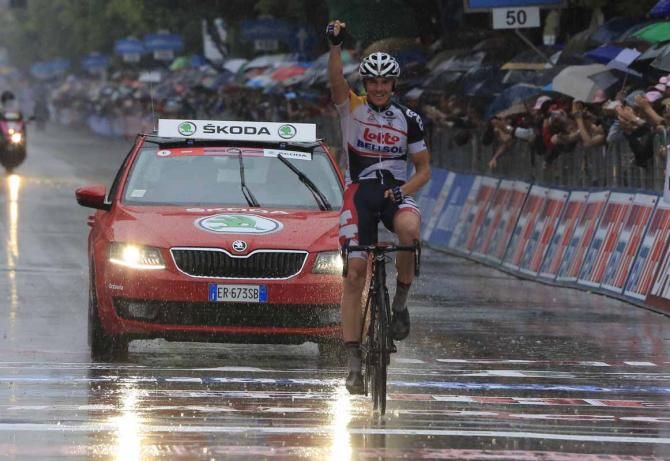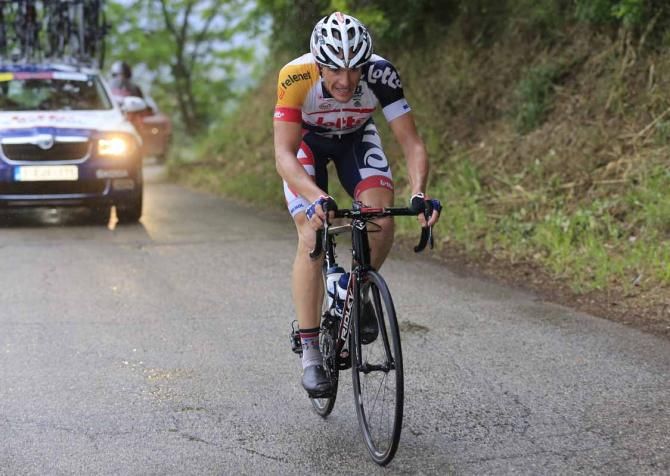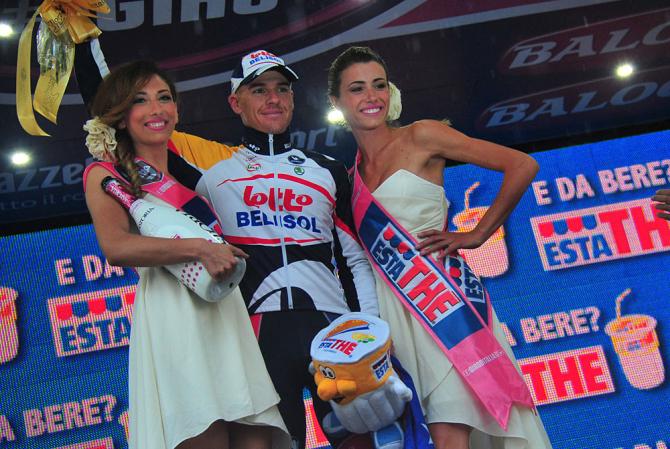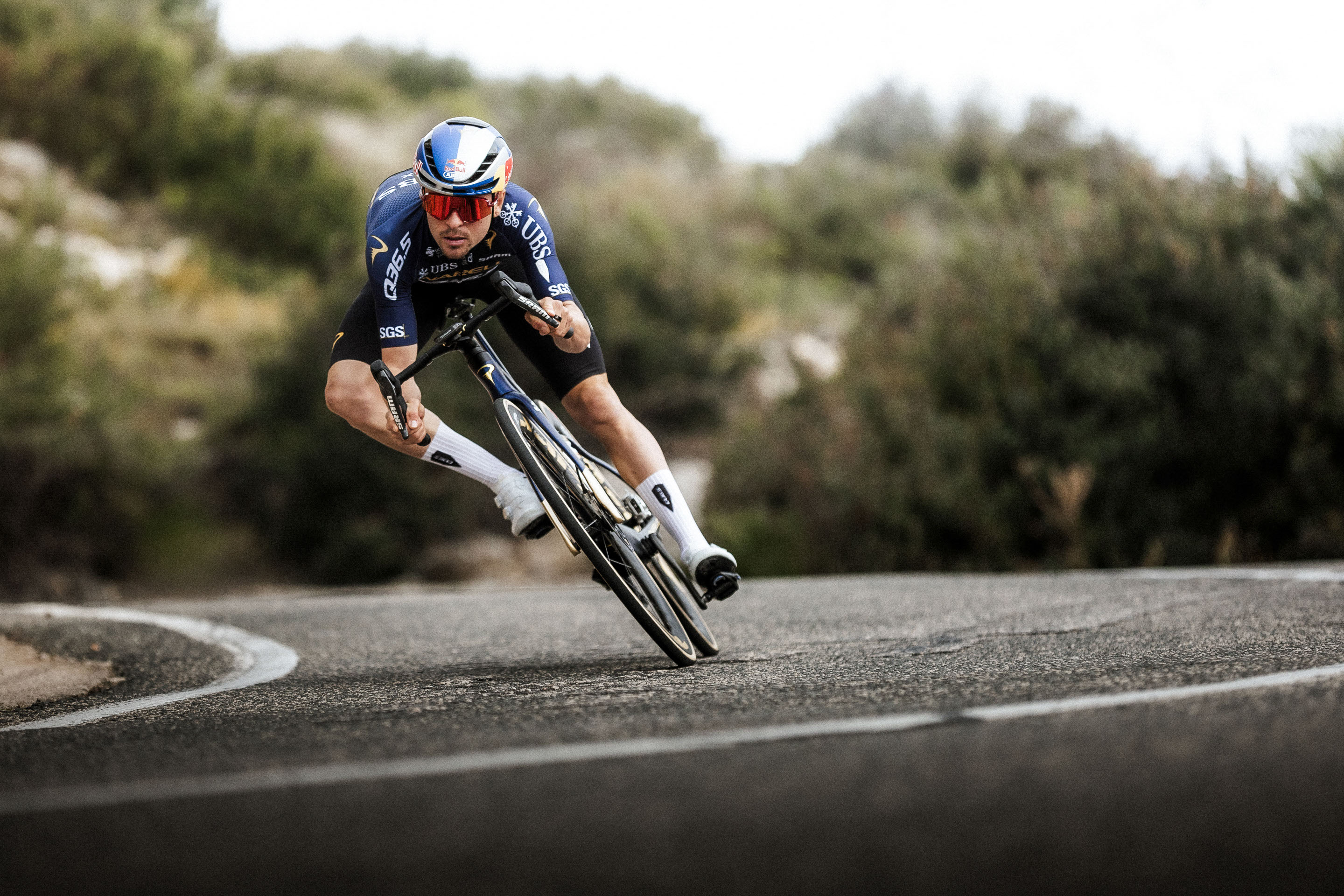'No one can take this away from me': Adam Hansen's Giro d'Italia stage triumph
Australian recalls revenge-fueled solo win in Pescara in 2013



Lotto Soudal's Adam Hansen is one of the most enigmatic super domestiques in the WorldTour. He is Australian but a resident of the United Arab Emirates, and lived in the Czech Republic for 15 years – the longest time the 39-year-old has been based anywhere, even when as a child.
Hansen has dedicated much of his career working at Grand Tours for prolific sprinters including Mark Cavendish, André Greipel and, most recently, fellow Australian Caleb Ewan. Yet, he has twice marked his own sweet success at the three-week stage races, taking a solo victory on stage 7 of the 2013 Giro d'Italia and stage 19 of the 2014 Vuelta a España.
He reveres the Giro d'Italia – even over the Vuelta and the Tour de France – and has competed in 10 editions of the Italian race – eight consecutively since 2012. Hansen was due to be at the Giro again this year before the season was suspended due to the COVID-19 pandemic.
"I think the fans are nicer; the Giro fans really follow the sport. I think the Tour is very commercial and very touristy. I won a stage of the Giro. I've got good memories there. And the food is better," he tells Cyclingnews.
On what was the day before his birthday, Hansen took his 2013 Giro stage victory on what was a 177km trek from sunny San Salvo to a grey, cold and rain-soaked Pescara, where crowds stood shoulder-to-shoulder along the route and children scaled walls to watch the finish, despite the pouring rain. Hansen broke clear 29km into the race and was the sole survivor of the day's main six-man escape.
It was a pre-meditated triumph, driven by determination and, perhaps, a little 'revenge' on Emanuele Sella – then with Androni Giocattoli, and now retired – who was the last man from the breakaway to be dropped.
Italian Enrico Battaglin – then competing for Bardiani Valvole, and now at Bahrain McLaren – placed second, 1:07 behind Hansen, with the now-banned Danilo Di Luca (Vini Fantini-Selle Italia) third.
The latest race content, interviews, features, reviews and expert buying guides, direct to your inbox!
Here, Hansen recalls for Cyclingnews, first-hand, his successful day seven years ago at the 2013 Giro.
I'd shaved my head the day before, and I was, like, 'Tomorrow is on.' Stage 7 was definitely the stage I'd picked out; I really wanted to be in the break and then I made the break – but I've made hundreds of breaks, so it wasn't that exciting that I was in the break in that sense. But I was happy I was there.
And then, as the stage went on, there was another rider… What was his name? I should know – small, little guy, tested positive for EPO, I think in 2008 [Emanuele Sella, who was suspended for one year from August 19, 2008, after testing positive for CERA in a July 2008 out-of-competition control]. I think he was third in the Giro [sixth overall in 2008, and later disqualified].
He was in the breakaway, too, and I was really angry because [at the 2008 Giro] he'd just ripped the race apart and I was just struggling in that race; everyone was struggling in that race. I think it was 2008, and it was the hardest Giro I'd ever done. It was just crazy. It was like 60-70 riders really struggling to make the time limit because of this one rider that was, like, five minutes in front of everyone. And then he tested positive, and took his ban, and then he was back in a small team, and there he was in a breakaway with me.
'There is no way this guy is going to beat me'
I just remember that on one of the climbs I was feeling really good, and I was putting a bit of pressure on him. I could see he was the one that could keep up with me.
In the end, it was us two by ourselves, and because he was a light guy, he struggled, because the stage that I won was more like a Tirreno-Adriatico stage – lots of short little climbs – and he had to stand up to climb, while I could sit down and climb better than he could standing up. And when he stood up, his back tyre always slid, so I had the advantage that I could sit down, have better traction, and I put a lot of pressure on him on the climbs.
It was crazy because he was a pure climber, and I was, like, 'There is no way this guy is going to beat me.' He put me through hell in 2008, so I really wanted to get this win on him.
I was always getting an advantage on him on the climbs, and he was always trying to catch me on the descent. Then he crashed on the descent – I think once or twice – but it was still a fair way to go to the finish, and I kind of needed him because they [the peloton] were racing behind because Bradley Wiggins [Team Sky] was having trouble; he was getting dropped. And then Vincenzo Nibali [Astana], and someone else, was attacking on the descents in the cold, trying to take advantage.
They were always a minute or 1:30 behind. So then I waited for this guy [Sella] when he crashed because there was a 15-20km flat section before the next climbs. We sort of worked together, and then I hit him again on the climbs and he was dropped.

Then I thought, 'OK – I'm by myself,' and I didn't think I was going to win because I've been in so many breakaways that always get caught. I was getting close to the finish – like, 5km to go, then 3km to go and I was, like, 'I'm going to get a flat tyre, for sure. Something has to happen because I don't win stages in Grand Tours.'
I was getting closer to the finish, and was thinking. 'Wow – am I really going to win this?'
And then I knew I had a huge advantage. I could have walked to the finish, but I still thought, 'No, this is not possible. Something is going to go wrong – something has to go wrong.'
With 200m to the finish, it really sank in. I thought, 'Wow, this is what cycling is really about.' You go out there, year after year, and you try, you try, you work for your team, you make so many sacrifices for your teammates, and then you sort of get a gift.
I felt as though someone had given me the gift of the win because of all the work I'd done for Mark Cavendish and André Greipel, and all the work for the other riders in teams over the years. I thought, 'Wow – this is how you get those stage wins.' It really hit me about 200m before I crossed the finish line.

'We won so often with André and 'Cav' that you just expected it'
I was so happy that I'd won a stage of the Giro – and that it was at the Giro. Like, over the Tour, over the Vuelta, it was just so nice. It was a super technical stage: wet, but dry and hot at the start. We had everything. I'd been able to drop him [Sella] on the climbs, and coming, I think, three years after my previous win [Hansen won a stage and the overall title at the 2010 Ster Elektrotoer], it was so nice.
It's totally different when you win for yourself, compared to helping a teammate win. I don't want to sound bad or anything, but we won so often with André and 'Cav' that you just expected it, if you know what I mean. And, for me, it wasn't about if they won or not; it was about whether I'd done a good job or not. If I did a good job, and they lost, I was happier than if they'd won and I'd done a bad job, just because we won so often.
Like, Andre's stats at Highroad were that he won 25 per cent of all the races he started in. It was crazy. That's how many wins he had. Cav won less, but he won higher-quality races. You know, when you're riding for both of them, every third race is a win, almost. So, winning for yourself, yeah, you have that feeling where you think, 'When I retire from the sport, this is something that I can take away with me. No one can take this away from me.'

It definitely gave me more confidence to try more, and after that I was a bit more tactical. With the Vuelta afterwards [Hansen won stage 19 of the Vuelta a España the following year], that was a totally different win, where it was a move I made in the final.
After the Giro victory, I was definitely way more active, and putting in more calculated attacks in the final, and the Vuelta was almost the same in the sense that before the Vuelta win, I would have done at least 10 stages when I'd attacked in the finale and they'd caught me in the last kilometre or 500m, and it was, for me, not an attack to win – it was more of an attack to see when they'd catch me, to see how far I could get.
On the Vuelta stage I won, I attacked in the final and was, like, 'Wow – I'm really going to get this one.' I also didn't believe it until I went around the last corner.
The stage win at the 2013 Giro was more pre-meditated. I wrote a tweet, too. I posted a picture of me with my shaved head, and wrote something like, 'Today is on. Who's going to come with me?' Winning after writing that was good.
